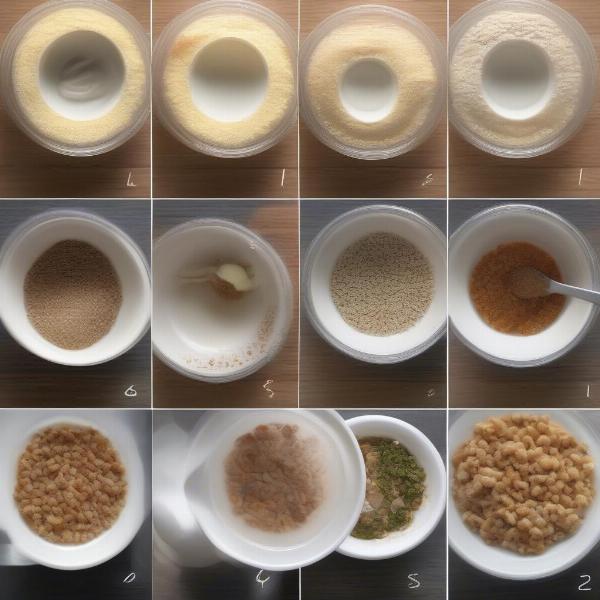Choosing the right food for your senior dog can feel overwhelming. With so many options available, it’s important to understand what your aging companion needs to thrive. Grain-free senior dog food has become a popular choice, and this article will delve into everything you need to know about this dietary option, helping you determine if it’s the right choice for your furry friend. We’ll cover the benefits, potential risks, ingredients to look for, and how to transition your senior dog to a grain-free diet.
Why Consider Grain-Free Food for Senior Dogs?
As dogs age, their dietary needs change. They may develop sensitivities to grains, experience digestive issues, or struggle with maintaining a healthy weight. Grain-free senior dog food can address some of these concerns. Many senior dogs experience improved digestion and increased energy levels when switched to a grain-free diet. Additionally, grain-free formulas often contain higher levels of protein and healthy fats, which are essential for maintaining muscle mass and supporting joint health in older dogs.
Is Grain-Free Dog Food Right for Every Senior Dog?
While grain-free diets can be beneficial for many senior dogs, it’s not a one-size-fits-all solution. Some senior dogs thrive on diets that include grains. It’s crucial to consult with your veterinarian before making any significant dietary changes, especially if your dog has pre-existing health conditions. They can assess your dog’s individual needs and help you determine the most appropriate diet.
What to Look for in a Grain-Free Senior Dog Food
Choosing a high-quality grain-free senior dog food is essential. Look for formulas that feature:
- High-quality animal protein sources: Chicken, beef, lamb, fish, or eggs should be the primary ingredients.
- Healthy fats: Omega-3 and omega-6 fatty acids support joint health, cognitive function, and skin and coat health.
- Digestible carbohydrates: Instead of grains, look for sources like sweet potatoes, peas, or lentils.
- Added vitamins and minerals: Senior dogs require specific nutrients to support their aging bodies.
- No artificial flavors, colors, or preservatives: These additives can be harmful to senior dogs.
Transitioning to a Grain-Free Diet
When switching your senior dog to a grain-free diet, it’s important to do so gradually. Start by mixing a small amount of the new food with their current food. Slowly increase the proportion of grain-free food over 7-10 days. This gradual transition helps prevent digestive upset and allows your dog’s system to adjust to the new diet.
What if My Senior Dog Doesn’t Like Grain-Free Food?
Not all senior dogs enjoy the taste of grain-free food. If your dog refuses to eat their new grain-free kibble, try adding a small amount of warm water or low-sodium bone broth to make it more palatable. You can also try different brands or flavors of grain-free food until you find one that your dog enjoys.
 Transitioning Your Senior Dog to Grain-Free Food
Transitioning Your Senior Dog to Grain-Free Food
Conclusion
Choosing the right food for your senior dog is a crucial part of ensuring their health and well-being. Grain-free senior dog food can be a great option for some dogs, offering potential benefits like improved digestion and increased energy. However, it’s vital to consult with your veterinarian before making any dietary changes and to choose a high-quality formula that meets your dog’s individual needs. By carefully considering your senior dog’s health, preferences, and dietary requirements, you can help them enjoy their golden years to the fullest.
FAQs
- Is grain-free dog food more expensive? Generally, grain-free dog food tends to be slightly more expensive due to the higher quality ingredients often used.
- Can grain-free diets cause heart problems in dogs? There has been some discussion about a potential link between grain-free diets and dilated cardiomyopathy (DCM) in dogs. More research is ongoing, so it’s essential to discuss this with your veterinarian.
- What are some signs of food allergies in senior dogs? Itching, skin irritation, digestive upset, and ear infections can be signs of food allergies.
- How often should I feed my senior dog? Most senior dogs do well with two meals per day.
- What are some other ways to support my senior dog’s health? Regular exercise, mental stimulation, and routine veterinary checkups are important for maintaining your senior dog’s overall health.
- Are there any grain-free dog food free trials I can try? Some dog food companies offer free trials or sample packs. Check with individual brands to see what’s available.
- What is wrong with Taste of the Wild dog food? While generally well-regarded, Taste of the Wild has been mentioned in discussions regarding DCM, similar to other grain-free brands. Consulting your vet is crucial.
Related Articles on ILM Dog
ILM Dog is a leading online resource dedicated to providing expert advice and information on all aspects of dog care and well-being. From breed selection and puppy care to senior dog health and nutrition, we’re here to help you provide the best possible care for your canine companion. We offer comprehensive guides on dog breeds, health, training, nutrition, grooming, and much more. Contact us today for personalized advice and support! Email: [email protected] Phone: +44 20-3965-8624 Visit ILM Dog for all your dog care needs.